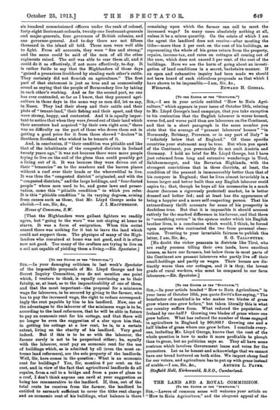[To THE EDITOR OP THE "Spactrror.. - ] Sin,—In your damaging criticism
in last week's Spectator of the impossible proposals of Mr. Lloyd George and his Secret Inquiry Committee, you do not mention one point which, I venture to think, is equally convincing as to their fatuity, or, at least, as to the impracticability of one of them, and that the most important—the proposal for a minimum wage for labourers, to be secured by giving to the farmer, who has to pay the increased wage, the right to reduce correspond- ingly the rent payable by him to his landlord. Now, one of the advantages to the labourer of the minimum wage is to be, according to the land reformers, that he will be able in future to pay an economic rent for his cottage, and that there will no longer be even the suggestion of a slur upon him that, in getting his cottage at a low rent, he is, to a certain extent, living on the charity of his landlord. Very good indeed. But if this is to be so with the labourer, the farmer surely is not to be pauperized either; he, equally with the labourer, must pay an economic rent for the use of buildings which, as is admitted by all (even the most ex- treme land. reformers), are the sole property of the landlords. Well, Sir, here comes in the question : What is an economic rent for buildings P Yea, Sir, mention 6 per cent. on the cost, and in view of the fact that agricultural landlords do all repairs, from a rail to a bridge and from a pane of glass to a rcof, I don't, think anyone can cavil at your suggestion as being too remunerative- to the landlord. If, then, out of the total rents he receives from the farmer, the landlord be entitled to earmark sufficient to cover the tithe rent charge and an economic rent of his buildings, what balance is there remaining upon which the farmer can call to meet the increased wage P In many cases absolutely nothing at all, unless it be a minus quantity. On the estate of which I am the agent the landlord does not receive—after meeting the tithe—more than 5 per cent. on the cost of his buildings, as representing the whole of his gross return from the property, repairs, income-tax, and rates on cottages all coming out of the sum, which does not exceed 5 per cent. of the cost of the buildings. Here we see the harm of going about an investi- gation of land conditions in a secret, backstairs manner. If an open and exhaustive inquiry had been made we should not have heard of such ridiculous proposals as that which I have shown to be impossible.—I am, Sir, &c ,














































 Previous page
Previous page